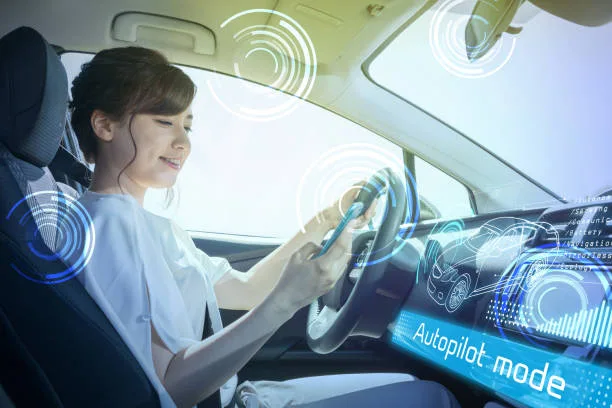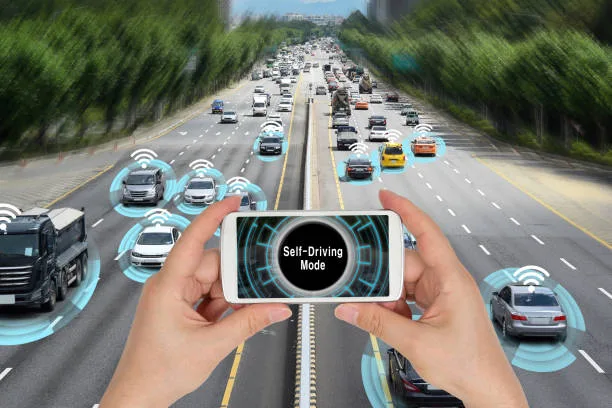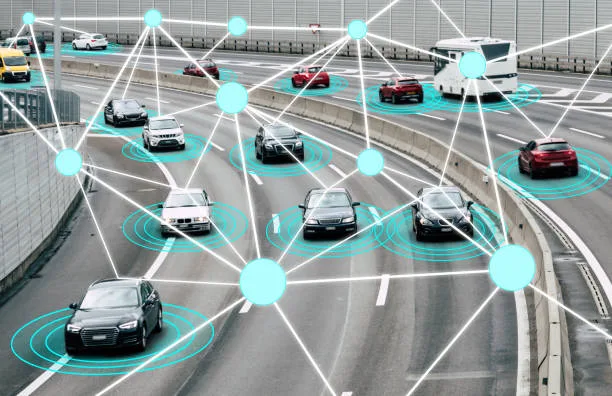Autonomous vehicles:

Imagine cruising down the highway, sipping your coffee, and chatting with friends while your car effortlessly navigates through traffic. It sounds like a scene from a futuristic movie, right? Well, the future is closer than you think, thanks to the rise of Autonomous vehicles, or Self-driving cars. These marvels of technology are poised to transform the way we get around. But do you know what’s the secret sauce that makes them tick? It’s a little something called “Edge computing.” In this article, we’re taking a road trip through the world of autonomous vehicles and the crucial role that edge computing plays in making them safe and efficient.
What is an autonomous vehicle?
Before we dive into the nitty-gritty of edge computing, let’s paint a picture of what autonomous vehicles are all about. Picture this: no more road rage, no more worries about parking, and certainly no more “Are we there yet?” from the backseat. That’s the promise of self-driving cars.
These autonomous wonders use a sophisticated mix of sensors, cameras, radar, and GPS to understand their surroundings. They can spot pedestrians, dodge potholes, and merge into traffic like pros. The ultimate goal? is to reduce accidents, beat traffic jams, and give Mother Earth a break by using fuel more efficiently.
But here’s the kicker: making these self-driving cars work seamlessly is a computational challenge like no other. They need massive computing power to process the endless stream of data from their sensors, make split-second decisions, and steer clear of trouble. That’s where edge computing steps in like a trusty co-pilot.
Read more: How Edge Computing Enhances Latency Issues in Real-Time Apps
What is edge computing all about?

Edge computing is like having a mini-brain inside your car. It’s all about doing the heavy thinking right where the action is, instead of sending all the data to some faraway cloud server. In the world of autonomous vehicles, edge computing means that most of the brainpower resides in the car itself or nearby, rather than relying on some distant data centre.
Why is edge computing such a game-changer for self-driving cars? Well, here are the pit stops on the road to its awesomeness:
1. Light Speed-Decisions
Imagine you’re driving, and suddenly a squirrel darts across the road. In a split second, you swerve to avoid it. Autonomous cars need to make lightning-fast decisions too. Edge computing lets them process data right on the spot, slashing the time it takes to analyse sensor data and respond. That means safer roads for all of us.
2. Fort Knox Security
In an age when hackers can get into just about anything, security is a big deal. Edge computing keeps your car’s data close to home, reducing the risk of cyberattacks. Your information and your car’s systems stay safer and sounder.
3. Bandwidth Bargains
Sending huge piles of data to a remote server can gobble up bandwidth like a hungry teenager at an all-you-can-eat buffet. With edge computing, your car only sends what’s necessary, saving bandwidth and keeping data costs in check.
4. Trusty Reliability
Imagine you’re on a cross-country road trip, far from civilization, and your car needs to make a critical decision. If it depends on a distant server, you’re out of luck. But with edge computing, your car can keep on truckin’, even in remote areas with spotty internet.
5. Real-Time Marvels
Edge computing is all about speed. It lets self-driving cars respond to ever-changing road conditions, sudden obstacles, and the zigzags of other drivers in real time. That’s like having a supercharged guardian angel on board.
Read More: How AI and ML Will Transform B2B Travel Software
Edge AI: The Brainpower Behind the Wheel

Edge AI, or Artificial Intelligence, is where the rubber meets the road in autonomous vehicles. It means running smart AI algorithms right on your car’s onboard computers or nearby servers. This gives your car the brains it needs to understand its surroundings, make decisions, and keep you safe. Here’s how edge AI revs up the engine of self-driving cars:
1. Spotting the Scene
Edge AI helps your car quickly identify and name things like people, other cars, and traffic signs. Knowing what’s essential for safe cruising.
2. Picking the Path
Navigating through traffic, avoiding obstacles, and selecting the optimal route are the areas of expertise for edge AI. It’s like having a GPS with a PhD in traffic science.
3. Predictive TLC
Nobody likes surprise breakdowns. Edge AI keeps an eye on your car’s systems, predicting when it needs a little TLC. That means fewer roadside emergencies and smoother rides.
4. Eye on the Driver
Ever wondered if your co-driver is paying attention? Edge AI can tell. It watches the driver’s alertness and steps in if it senses trouble, keeping everyone safe.
5. Emergency Hero
In the worst-case scenario, when a collision is imminent, edge AI can take the wheel to slam on the brakes or swerve to save the day. It’s like having a superhero in the driver’s seat.
Read more: Uncovering Edge Computing Use Cases Shaping and Inspiring Various Industries
Conclusion: The Road Ahead
As we zoom into the future, one thing’s clear: edge computing is steering the ship of autonomous vehicles. Its ability to process data right where the rubber meets the road is essential for making self-driving cars safe and efficient. This technology brings us closer to a future where our commutes are more than just a daily grind—they’re a chance to relax, catch up with friends, or simply enjoy the ride.
So, whether you’re a tech enthusiast eager to embrace the future or just someone tired of the daily commute, you can bet that edge computing is the highway to a safer, smoother, and more convenient ride. As edge computing and AI continue to evolve, self-driving cars will become a common sight on our roads, making transportation not just autonomous but also incredibly exciting. Get ready to fasten your seatbelt and enjoy the ride to the future of transportation.










